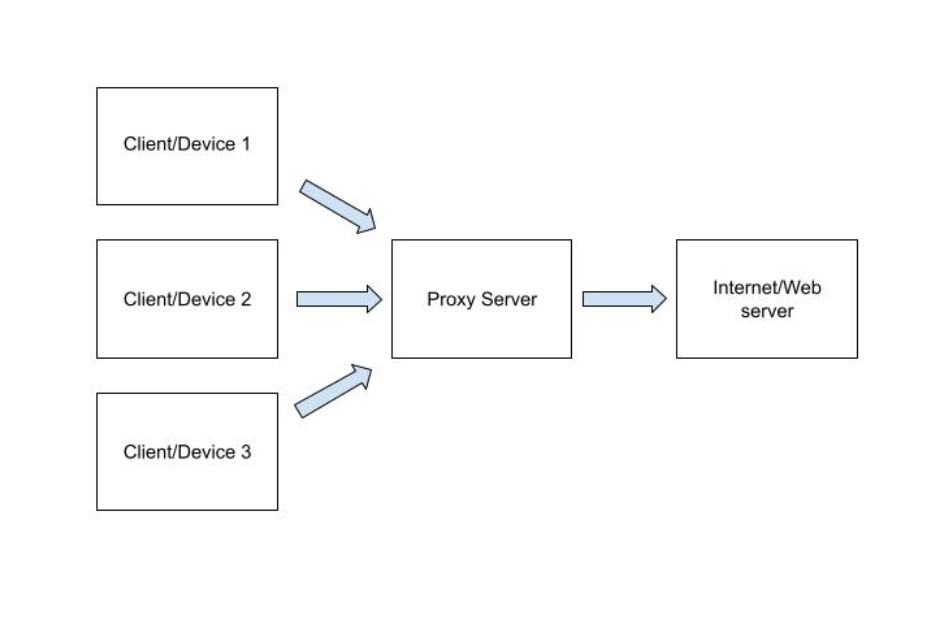Proxy servers are commonly used and especially beneficial for remote workers and improving privacy and security measures when working or simply browsing the web. By using a proxy services, you can access content otherwise blocked in your region, filter out harmful or inappropriate content, protect your sensitive data and speed up response times.
Today’s article will discuss the basics of using a proxy server for privacy and security, how it works, why you should use it and the different types of proxies.
What’s a proxy server?
To understand how a proxy server works, first, we need to define what is an IP address. Every computer has an IP (Internet Protocol) address that identifies the device using a public or private network and detects its location.
A proxy server is a system or a router with its own IP address acting as a gateway between the user and the Internet. Your computer connects through the proxy server’s IP address instead of its own to access web content, build a firewall and prevent cyberattacks and invasions of private networks.
How do proxy servers work?
When the client tries to connect to the web server through their device, the connection first goes through the proxy server for evaluation (to visualize a proxy server’s function, refer to the graphic below).
This means the proxy can encrypt data, filter out content, change the device’s IP address and even block entire content pages. Another proxy function is to cache data, thus speeding up request and response times.
*A graphic representation of how proxy servers work in client-server communication
People use proxy servers mainly for privacy and security reasons, but other functions are worth considering. You can access region-restricted content by connecting through a proxy server based in that region or control specific web content access by the internal network.
You can also save on bandwidth because proxies cache files and web page versions, compress incoming traffic, balance your web traffic and control internet usage to prevent interruptions.
What are forward proxies?
Forward proxies are one of the most commonly used types of proxy servers. They are best suited for isolated/internal/private networks (or intranet) to examine requests from clients and pass them to the Web Server through a firewall or serving cache versions to reduce traffic.
The working process of a forward proxy begins with examining the incoming request depending on the restrictions and deciding to allow or reject it. If the request is denied, the client receives an error or gets redirected.
In case of a valid request, the proxy checks for cached information to present to the client. If there is none, the proxy server forwards the request through the firewall to the web server and receives it back before serving it to the client.
Forward proxies provide a high level of security for intranet users and give administrators a high level of control. A disadvantage is the limited ability to cater to individual end-user needs because of specific restrictions.
What are reverse proxies?
As opposed to forward proxies, reverse proxies sit before web servers, meaning they pass a request from the Internet to the private network through a firewall. They intercept client requests at the network edge of the web server, thus protecting the Internet client’s sensitive data residing on content servers.
Reverse proxies are commonly used by popular websites with a lot of traffic for a couple of reasons. First, a reverse proxy helps reduce bandwidth load by managing incoming requests and serving cached information.
Second, it can spread the incoming requests across several content servers on a protected network without informing the Internet client which those servers are. A disadvantage of this type of proxy is that administrators need to upgrade their firewall to ensure attackers won’t be able to access the HTTP server architecture.
Why should you use a proxy server?
Organizations and hotels, in particular, can use proxy servers for several reasons, including to protect staff and guest data privacy and web security and anonymity, control internet usage and prevent connection interruptions and save bandwidth and improve speed.
However, it’s essential to consider that using a proxy is only a part of a larger security plan that needs to take place if you want to prevent data breaches and related issues.
To improve web and data security
One of the main benefits of proxy servers is that they help you improve web and data security measures. They act as a firewall between clients and destination servers and reduce the risk of malicious infiltration.
You can benefit from secure connections, data breach protection, data safety and protected users. In addition, you can oversee sensitive data usage and behavior by privileged users.
To control internet usage
By using a proxy server, hotels can control internet usage and limit or deny access to specific web pages due to various reasons. One can be that you want to prevent children from accessing harmful content or content that isn’t child-friendly.
Another can be that you want to preserve your brand’s image and limit unsafe website access. Hoteliers can also track internet behavior by employees, for example, to enhance productivity and efficiency.
To save bandwidth, improve speed and balance traffic
A proxy server helps you save bandwidth, improve speed and balance traffic by sending only one request even if multiple users try to access it. In addition, it saves a cached version of websites that it serves to the client instead of forwarding it to the web server every time.
Stripping ads and compressing traffic increases bandwidth savings and consequently improves overall internet speed and performance.
To increase privacy and anonymity
Proxy servers use their own IP address instead of the client’s actual IP address and preserve the user’s data such as location and identity. This function helps to keep your sensitive documents and data safe.
The web server does not recognize who made the original request because the proxy anonymizes the traffic that goes through it.
Proxy server risks
As a third-party service, proxy servers also present some risks to organizations. It’s likely to encounter a lack of encryption, limited privacy, data logging, open ports and inconsistent speed. That’s why it’s essential to do your research and choose a reliable proxy server provider and Internet service provider before you start using it.
Types of proxy servers
There are various types of proxy servers, such as forward and reverse proxies discussed above. However, there are three main proxy servers: high-anonymity, anonymous and transparent proxies. These three types differ in their qualities in protecting your IP address.
Transparent proxies are often used to filter content because they do not hide the real IP address. Anonymous and high-anonymity proxies use a fake IP address instead of a real one. The difference is that with high-anonymity proxies, sites won’t be able to determine that you’re using a proxy server and, therefore, cannot block incoming traffic.
Some types of proxy servers are:
- Open or Forward Proxy Server
- Reverse Proxy Server
- Split Proxy Server
- Transparent Proxy Server
- Non-Transparent Proxy
- Hostile Proxy
- Intercepting Proxy Server
- Forced Proxy Server
- Caching Proxy Server
- Web Proxy Server
- Anonymous Proxies
- Socks Proxy
- High Anonymity Proxies
- Rotating Proxy
- SSL Proxy Server
- Shared Proxy
- Public Proxy
- Residential Proxy
- Distorting Proxy
- Data Center Proxy
- HTTP Proxy
FAQs
What is a proxy server?
A proxy server is a router or a system with its own IP address. Its primary function is to act as an intermediary server between the client and the webserver, thus protecting the client from harmful content, invasion of privacy and unsafe websites.
How does a proxy server work?
A proxy server receives requests from the client (end-user) before reaching the web/content server. It evaluates the request and decides whether it should forward them to the server or not.
A proxy can deny a request if the client is trying to access forbidden content or an unsafe website, in which case he receives an error or a redirect.
What are the benefits of a proxy server?
Proxy servers offer many benefits for their users:
- providing web security
- increasing privacy
- enhancing data safety
- controlling internet usage
- saving bandwidth
What are the types of proxy servers?
There are many types of proxy servers, but we can generally categorize them into transparent, anonymous and high-anonymity proxies.




